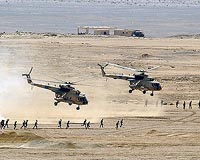| . |  |
. |
Amman, Jordan (UPI) Aug 27, 2009 With Saudi Arabia spearheading the arms race in the Middle East, defense spending in the region will exceed $100 billion by 2014, according to a study released by Frost & Sullivan. "Saudi Arabia, the United Arab Emirates and Israel are poised to be the region's four biggest spenders on defense," the report said. Last year, the U.A.E. poured some $4 billion into its military, with Israel paying around $13 billion. Now, the report says, Saudi Arabia looked set to pay out at least $36 billion annually over the next five years. "The ratio of their defense spending to that of their total GDP is the highest in the world," the report notes, stressing that the ratio was unaffected by the global economic slowdown and fluctuating oil prices. "The financial muscle of countries like Saudi Arabia and the UAE is enabling them to keep spending a huge chunk of their GDP on defense," Frost & Sullivan analysts reported. Globally the Middle East is forecast to account for 11 percent of all arms spending by 2014. The appetite has been so intense that Bahrain and Jordan have requested permission from the United States to buy advanced air-to-air missiles in deals estimated to top $200 million. Earlier this month the Defense Security Cooperation Agency, a branch of the U.S. Department of Defense, published relevant details of the deals on its Web site. According to the details, Jordan is eyeing 85 AIM-120C-7 advanced medium-range air-to-air missiles and six 120 C captive air training missiles in a deal estimate at around $130 million. Bahrain, is also considering the purchase of 25 AIM-120C-7 missiles estimated at $4 million. The DSCA said the purchases "would not alter the military balance in the region." While the deals have yet to be concluded, the main beneficiaries of Middle East arms spending may include global arms suppliers, including Russia, staking out new territories as the U.S. and European markets have become saturated, analysts suggested. "It will be major countries like Russia that benefit," said Gautam Ganapathy, lead author of the report. The Middle East military market also holds promise of political gains, as defense sales can forge or buttress new alliances and increase regional influence. "Russia, for example, might want to sell its equipment through government-owned firms, to enable the government to win financial and diplomatic gains," said Balaji Srimoolanathan, program manager for aerospace and defense at Frost & Sullivan. "It buys influence in political deals." What has triggered the spending spree? The report cites external and internal security threats, with a potential nuclear Iran topping the list. "The high presence of non-state actors who have a fundamental and religious agenda (means) internal security has become one of the top priorities for countries in the Middle East," the report said.
Share This Article With Planet Earth
Related Links The Military Industrial Complex at SpaceWar.com Learn about the Superpowers of the 21st Century at SpaceWar.com
 Russia, Saudi Arabia near deal on helicopter sale: report
Russia, Saudi Arabia near deal on helicopter sale: reportMoscow (AFP) Aug 25, 2009 Saudi Arabia is close to signing an agreement to purchase 30 Mi-171B military transport helicopters from Russia, a source familiar with the talks was quoted as saying on Tuesday. "We are in the final stage of negotiations on the purchase of a shipment of 30 helicopters and hope to sign an agreement in September," the source told Russia's RIA-Novosti news agency. The Mi-171B is a large ... read more |
|
| The content herein, unless otherwise known to be public domain, are Copyright 1995-2009 - SpaceDaily. AFP and UPI Wire Stories are copyright Agence France-Presse and United Press International. ESA Portal Reports are copyright European Space Agency. All NASA sourced material is public domain. Additional copyrights may apply in whole or part to other bona fide parties. Advertising does not imply endorsement,agreement or approval of any opinions, statements or information provided by SpaceDaily on any Web page published or hosted by SpaceDaily. Privacy Statement |